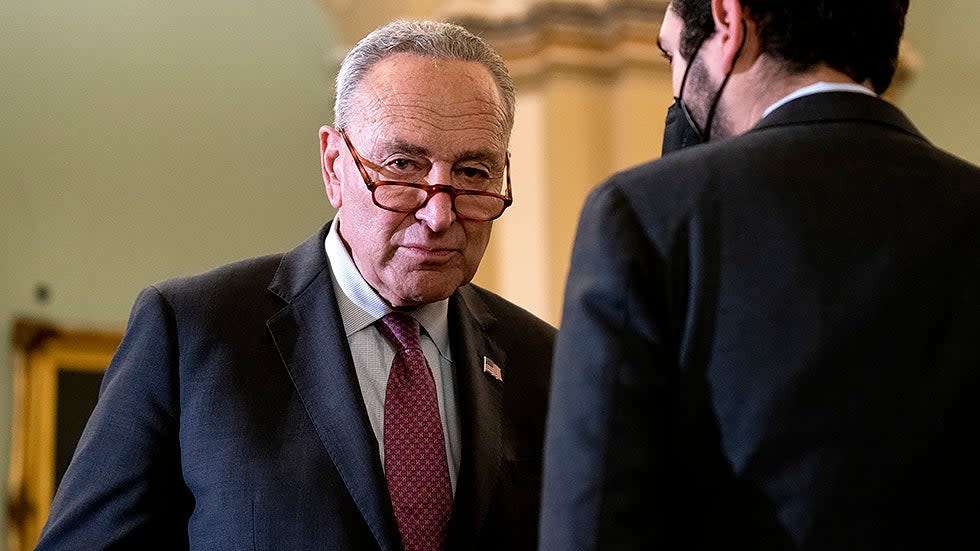Senate Democrats raise debt ceiling after filibuster deal

- Oops!Something went wrong.Please try again later.
- Oops!Something went wrong.Please try again later.
Senate Democrats on Tuesday voted to raise the debt ceiling, bypassing a GOP filibuster as part of a deal struck by congressional leaders.
Senators voted 50-49 along party lines to raise the debt ceiling by $2.5 trillion. Though GOP senators supported legislation last week setting up the simple majority vote, none voted for the bill to increase the debt ceiling.
"As I have said repeatedly, this is about paying debt accumulated by both parties, so I'm pleased we came together to facilitate a process that has made addressing the debt ceiling possible," Senate Majority Leader Charles Schumer (D-N.Y.) said ahead of the vote.
"Responsible governing has won on this exceedingly important issue. The American people can breathe easy and rest assured there will not be a default," he added.
The House is expected to vote to raise the debt ceiling as soon as Tuesday. Treasury Secretary Janet Yellen has given lawmakers until Wednesday to increase the nation's borrowing limit and keep the government solvent.
Democrats unveiled the legislation to increase the debt ceiling by $2.5 trillion hours before Tuesday's vote. Senators estimate it would set the next debt ceiling cliff for sometime in 2023, getting Congress past the midterms.
The agreement to set up a one-time exemption to the filibuster sparked pushback from GOP senators, who believe that Republicans should have stuck by their months-long demand that Democrats raise the debt ceiling on their own through budget reconciliation.
But GOP leadership argue that the deal was a win because it accomplishes many of their goals: Making Democrats raise the debt ceiling on their own to a specific number and a fast-track process that lets them pivot the focus back to the Build Back Better legislation, which they view as a more promising target.
Senate GOP Leader Mitch McConnell (R-Ky.) knocked Democrats on Tuesday, linking the vote to the spending legislation and high levels of inflation.
"Every Senate Democrat is going to vote on party lines to raise our nation's debt limit by trillions of dollars. If they jam through another reckless taxing and spending spree, this massive debt increase will be just the beginning," he said.
"More printing and borrowing to set up more reckless spending to cause more inflation to hurt working families even more," McConnell added.
Tuesday's vote largely brings to a close a rolling debt ceiling fight that has lasted for most of 2021.
Congress previously passed a short-term debt hike in early October, but it was an agonizing, down-to-the-wire affair with Republicans spending hours rounding up the 10 GOP votes needed to advance the debt ceiling bill.
McConnell vowed in a letter to Biden afterward that "I will not provide such assistance again if your all-Democrat government drifts into another avoidable crisis."
But McConnell and Schumer started negotiating last month to try to find an off-ramp, keeping the talks closer to the vest with GOP senators, including McConnell allies, saying at the time that they were largely in the dark.
They initially floated tying the debt ceiling to a sweeping defense policy bill, but that sparked pushback from both House leadership and Senate Republicans.
Instead, they linked the legislation setting up the filibuster-exemption to preventing Medicare cuts in a bid to shore up GOP support.
The passage of the debt ceiling hike kicks the borrowing limit into 2023, potentially setting up a massive headache for Biden if Republicans win back the House or Senate. But Democratic senators said they settled on the debt ceiling increase amount as part of an agreement with Republicans.
Some Democrats are talking about trying to abolish the debt ceiling altogether, an idea that has been floated by lawmakers in both chambers but struggled to gain enough support to pass.
"This last round has made it clear that this is a tool of politicians, for politicians; it defies common sense," Wyden said. "It needs to go."

